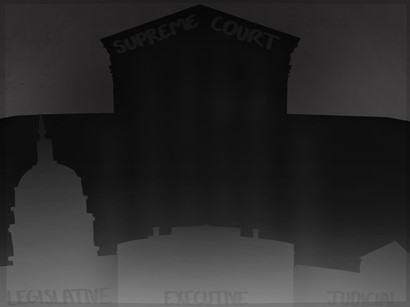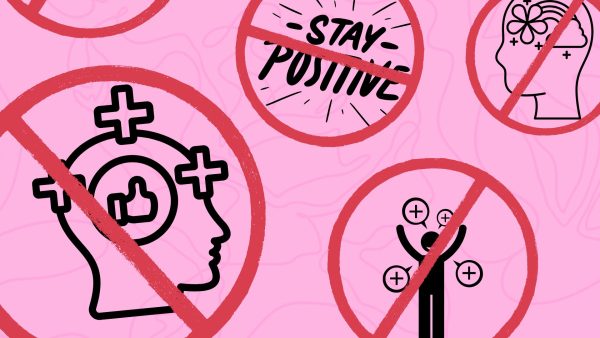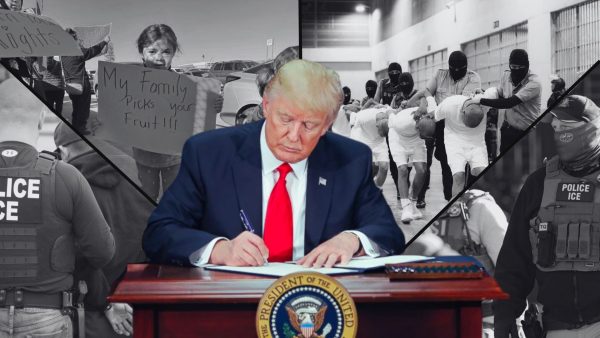Opinion: The Monopoly of the Supreme Court

The Supreme Court looming over the three branches of government.
“The judicial Power of the United States, shall be vested in one supreme Court, and in such inferior Courts as the Congress may from time to time ordain and establish.”
It might come as a surprise to most with the accusation of an imbalance of power within the branches of the federal government. After all, most of us learn in school that our system of government is superior to most, due to the fact that no one person has all the power. There’s checks and balances.
However, with recent rulings of the Supreme Court, along with the failures of the other branches to “check” the Supreme Court, you could call the Supreme Court a monopoly.
Let’s start with the most obvious and one of the most highly criticized aspects of the Supreme Court: the lifetime service they have.
Now, our constitution does not explicitly state that the justices of the Supreme Court should have lifetime sentences. It was interpreted in that way. The only requirement is that the justices “shall hold their Offices during good Behavior,” meaning that they can technically hold their seat until they die.
This is a problem for a multitude of reasons. First, it doesn’t allow the American public to truly choose who they want. Supreme Court justices have been known to serve for as long as 36 years. That’s an entire GENERATION passed by. New findings, new ideals, and a new American public can be born during that time.
Especially nowadays, there has been an increasing anger towards the fact that an older generation is serving on the Supreme Court and many of us have been wondering; why is the past of America dictating what the future of America can do?
And that’s speaking for the legislative branch as well, but the Supreme Court specifically has made an absolute mess as of last year. Of course, I’m talking about the case of Roe v. Wade, a landmark case which allowed abortion to be a choice on the federal level.
I think this is when America paid the most attention to the Supreme Court in recent history. The overturning of Roe v. Wade didn’t mean the banning of abortion, but it might as well have. Because it gave the choice back to the states on deciding on whether abortion would be legal, to which half the states in the country put some sort of restriction on abortion rights. Even in cases of incest or rape.
Now, what does the American public think about abortion? Surely the Supreme Court at this point wouldn’t solely base their decision on a vague 200-year-old toilet paper roll? Surely, they would look at what the American public thought about the right to abortion. Surely, surely, if this decision was made, that the American public would have a negative opinion on abortion.
Oh? What’s that? 61 percent of Americans think that abortion should be legal in all or most cases? How interesting. Well, to be courteous, maybe it’s religious people holding it back. Despite our constitution, which is practically the religion of the Supreme Court, stating a separation of Church and State.
Oh? WHAT’S THAT? 66 percent of Black Protestants, 60 percent of White Protestants who are not evangelical, and 56 percent of Catholics believe abortion should be legal in all or most cases.
And this is a point for one main reason. That the American public, the people who the government are supposed to represent, do not share the same sentiment about abortion that their lawmakers and specifically their Supreme Court justices do.
As stated before, it has to do with age. About half of the justices are above the age of 60. SPECIFICALLY, 60 because that’s the age many pilots are FORCED to retire. If laws require pilots to retire at 60 because of their age, due to complications they might have, hindering their ability to fly an aircraft, then what is the stopping point for justices who make unpopular decisions for the entirety of America, affecting millions?
I also take a huge problem with the certain qualifications the justices currently sitting on the Supreme Court have. Under the umbrella of education, every single one of the justices ARE qualified. They were all judges, lawyers, and went to top notch schools.
I’m specifically talking about the hearings the justice appointees go through before they’re approved by Congress.This is a step where Congress basically evaluates the justice nominee. Usually, the opposite party of the President will try and embarrass the justice nominee in order to not get them approved.
Are these hearings taken seriously? Well, I doubt so.
Clarence Thomas was accused of sexually harassing women at his place of work. Specifically, and most notably, by a woman of the name of Anita Hill, who testified to Congress on her experience.
As you can see, it didn’t matter, as he was appointed anyway.
In my opinion, people should not only have a good education to be on the highest court of the land, but also have a good moral compass. It might be a crazy statement but harassing women isn’t a good moral compass. That’s not someone I want deciding landmark cases such as Roe v. Wade or any other court decision. Because automatically, it screams bias. And the most glaring issue is that a bad person shouldn’t be given such power!
And then to another example. Amy Coney Barrett’s Congress hearing. When asked about the five freedoms of the first amendment, she struggled to name them. Being under pressure is one thing, but if I could do it in my sleep, then an adult woman answering questions to be on the highest court of the land MUST. Her hearing was a mess, especially when she lied about not even considering to overturn Roe v. Wade because it was a “landmark case.”
Actually, that was a lie that a lot of the justices appointed in recent years said. Weird.
Now the solution to this whole situation is quite simple. Too simple really. I’m not expecting any lawmakers to ever go through with it, especially after they failed to codify Griswold v. Connecticut, Lawrence v. Texas, Roe v. Wade, Obergefell v Hodges and Loving v. Virginia into law years ago.
Simply put, according to the uscourts.gov, while the Constitution establishes the Supreme Court as a main branch, it allows Congress to choose how to organize it. Congress chose how the Supreme Court works today.
Congress needs to change how the Supreme Court works. This will alleviate the monopoly the Supreme Court is having right now. Terms should be limited, and there should be a cap on age of the justices. Questioning and background checks need to be more important to the overall process.
Because this is a problem within the major problem of checks and balances; how much power is truly given to the American public. Because at the end of the day, WE are living with the consequences of unjust laws and decisions being made.

Gwynevere (Gwyn) Castro is a senior. She's involved in many clubs, including Women's Alliance, Model UN, Debate and EAC. Catch her writing...

Isabela Catalan is a junior. She is part of the Art Club and the costumes/design tech team for backstage theatre. In her free time, she enjoys...





